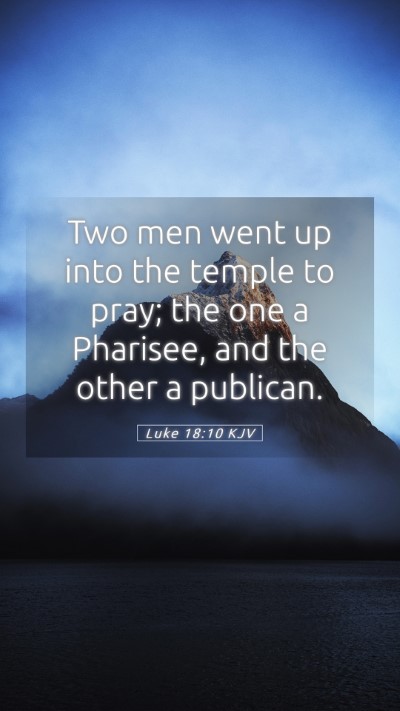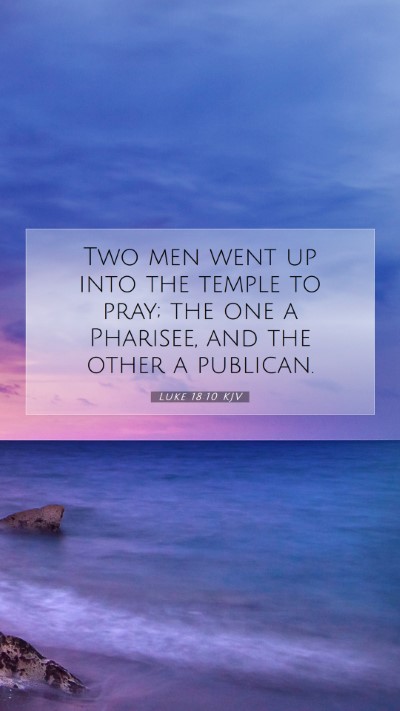Bible Verse Meaning: Luke 18:10
Verse: "Two men went up into the temple to pray; the one a Pharisee, and the other a publican." (Luke 18:10)
Overview
The verse begins a parable told by Jesus, contrasting two individuals—the Pharisee and the publican (tax collector)—to illustrate key spiritual lessons about pride, humility, and the nature of prayer. This parable provides valuable Bible verse interpretations that delve into the heart of true faith.
Summary of Insights
Matthew Henry's Commentary
According to Matthew Henry, this parable highlights the dangers of self-righteousness. The Pharisee represents those who rely on their own perceived righteousness rather than God’s grace. His prideful prayer exemplifies how superficial confidence in one’s moral standing can blind a person to their actual spiritual state.
Albert Barnes' Commentary
Albert Barnes emphasizes the contrast between the two figures in the parable. He notes that the Pharisee, by virtue of his societal position, considers himself superior and looks down on others. In contrast, the publican, aware of his sinfulness, approaches God with humility and earnestness, recognizing his need for mercy. This serves as a critical aspect of Bible verse commentary, illustrating the attitude one should have in prayer.
Adam Clarke's Commentary
Adam Clarke draws attention to the cultural context of the Pharisee and publican’s roles in society. The Pharisee, a religious leader, embodies external piety, whereas the publican symbolizes social outcasts. This reflects the deeper message that public acknowledgment of guilt and dependence on God’s mercy is essential, thereby exemplifying true Bible study insights.
Key Themes in Luke 18:10
- Humility: Both Matthew Henry and Clarke stress the importance of approaching God with humility.
- Pride: The Pharisee's pride serves as a warning against self-righteousness and the false confidence that accompanies it.
- Prayer and Repentance: The publican's heart of repentance illustrates the nature of true prayer that seeks forgiveness.
Practical Applications
The teachings of this verse encourage individuals to:
- Self-examine: Reflect on one’s own attitudes towards spirituality and humility.
- Practice humility: Approach God with a contrite heart, acknowledging personal shortcomings.
- Engage in genuine prayer: Develop a consistent prayer life that emphasizes seeking God’s mercy rather than personal merit.
Cross References
Luke 18:10 can be related to several other scriptures that echo its themes:
- Luke 18:11-12 - The continuation of the parable with the Pharisee’s self-congratulatory prayer.
- James 4:6 - "God resists the proud, but gives grace to the humble."
- Matthew 5:3 - "Blessed are the poor in spirit, for theirs is the kingdom of heaven."
Conclusion
In summary, Luke 18:10 serves as a profound reminder of the necessity of humility in our relationship with God. By studying this verse and its context, individuals can gain a deeper Bible verse understanding of what it means to come before God as a sinner in need of grace, rather than a self-righteous observer of the law.


